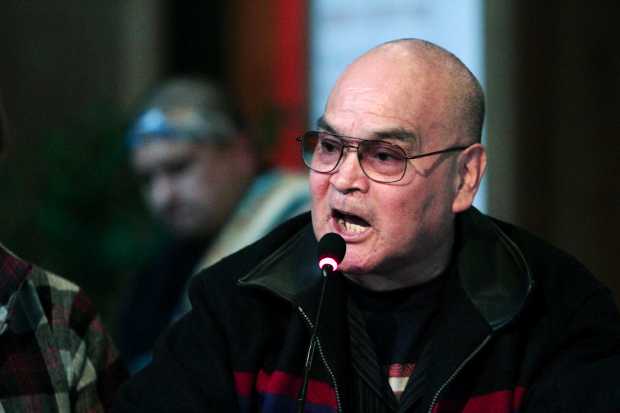Victims of Abuse Tell Their Stories to Truth and Reconciliation Commission in Duncan
By Judith Lavoie
The anger was palpable Thursday as 64-year-old Louis Moses Lucas sat between supporters and disclosed his abuse by priests and nuns. “Residential schools were nothing but the rape of our people. They were sexual terrorists,” Lucas told commissioner Marie Wilson of the Truth and Reconciliation Commission at hearings. “It was never a school to me. It was a jail,” said Lucas, blaming the Catholic Church and federal government for not helping the 150,000 First Nations, Metis and Inuit children in Canada who were taken from their families and placed in residential schools. “This is my statement to Canada. Saying they didn’t know is a bunch of bull—. It was nothing but jail. Genocide of our people,” he said. Emotions ran high as about 250 people, both aboriginal and non-aboriginal, listened to harrowing stories, many about the Catholic-run Kuper Island Indian Residential School near Chemainus. Tissue boxes were distributed, helpers provided support, and at least one woman was rushed out of Quw’utsun Cultural Centre sobbing uncontrollably. Some held bowls to catch the tears. “Our belief is that tears shed are sacred and powerful. These basins are to collect the tears and carry them away,” Chuck Seymour said. Telling the stories is vital, said Cowichan Tribes Chief Harvey Alphonse in an interview. “The legacy of abuse still remains in our community, and one way to heal is to speak about what bothers you,” said Alphonse, 62, who was abused for seven years at Kuper Island and at St. Mary’s school in Mission. The schools left a dysfunctional society, said Alphonse, who believes cultural revitalization is essential. “I didn’t start the healing process until I was 42 years old, and anger was directed at my family,” he said. A breakthrough came with a book that described experiences almost identical to his own. “I couldn’t get past the first five pages without rolling tears,” he said, as tears welled in his eyes. Effects trickle down generations, said Lana Jack, describing an abusive childhood at the hands of two survivors. “I can only imagine how many times they were ripped from their sleep by their hair [by the memories], but, on my mother’s deathbed, she made me promise I would be the one that could work in forgiveness and love,” she said. “We have got to change our communities for our children.” A hush fell as Raymond (Tony) Charlie traced his experiences from the first rape in the early 1960s to the conviction of Brother Glen Doughty in 2002 after 13 former Kuper Island residents testified against him. The first rape was shocking, Charlie said. “I was really scared, and I didn’t tell anyone,” he said. “Then some individual accosted my younger brother and brought him to his room. He tried his sick actions with my brother, who was very young, not even a teenager. He wouldn’t co-operate. Instead, he ran to the window and jumped out of it,” Charlie said, his voice breaking. His brother survived because he landed on a roof, where he waited hours to be rescued. Both Charlie brothers were later abused by another priest, but neither talked about it until three decades later. “We suffer from poor parenting skills and broken families and this mess is directly related to the residential school system,” Charlie said. “Shame on Canada and shame on the church for your wanton neglect of survivors.” Speakers talked about lives of shame, alcoholism and suicidal thoughts, but, for most, their disclosures were followed by a need to find a way to forgive and heal. Elmer James was taken from his home by “two men in black” when he was six years old. James said the abuse by nuns and brothers left him feeling worthless. “But it’s not in our culture to take revenge on the people who hurt you,” he said. “I have learned to let go and not be ashamed of who I really am. …Be proud of who you are.” Jenny Martin brought a red rattle to the table. “I was stolen and imprisoned in Kuper Island from 1958 to 1964,” she said. “I lack parenting skills, I lack communication skills. I lack self-esteem. I lack confidence. I had nearly no cultural skills. I didn’t know who my relatives were. My whole life was robbed. I hated God.” The commission’s aim is to tell Canadians about residential school history and facilitate reconciliation among aboriginal communities, churches and governments. “The degree of ignorance as a nation has been huge,” said commissioner Wilson. A regional event will be held in Victoria April 13 and 14. Contact: jlavoie@timescolonist.com
|
.
Any original material on these pages is copyright © BishopAccountability.org 2004. Reproduce freely with attribution.
